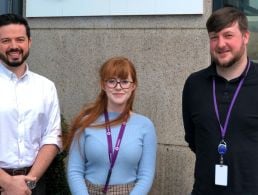The STint programme is a 12-week paid internship for primary and post-primary STEM teachers in Ireland who want to get a flavour of the industry.
A programme for early-career and student teachers that enables them to intern with companies working in STEM has secured funding for the next three years.
The funding comes from Intel, Science Foundation Ireland and Skillnet Ireland. The total amount for the three years is just under €1m.
The STEM Teacher Internship (STint) programme is a Dublin City University (DCU) initiative. It was designed to give STEM teachers an opportunity to get hands-on, paid work experience before they embark on their teaching careers.
The idea is that the teachers will be better able to inspire their students to choose STEM careers, having worked in the industry themselves.
To date, the programme has placed 177 teachers in more than 40 of Ireland’s leading companies. It was established initially by DCU in 2016, and has since become nationwide.
Partners such as Accenture, the 30% Club and Connecting Women in Technology are supporters of the scheme. It is one of the first programmes of its kind in Europe. Science Foundation Ireland has also provided funding and support for several years now.
In the summer months of this year, more than 80 early career STEM teachers will work as interns in 47 host companies. Internships can be fully remote, onsite or hybrid. They last 12 weeks and are open to both primary and post-primary teachers.
Commenting on the programme’s expansion, Minister for Further and Higher Education, Research, Innovation and Science Simon Harris, TD, said it will provide “an invaluable opportunity for trainee teachers to gain practical insights into real life applications of STEM knowledge across a range of diverse sectors”.
“This collaborative approach between higher education, government agencies and industry provides STEM teachers with unique and engaging learning opportunities, and ultimately helps develop a more diverse future STEM talent workforce for our economy,” he added.
10 things you need to know direct to your inbox every weekday. Sign up for the Daily Brief, Silicon Republic’s digest of essential sci-tech news.
Updated, 11.20am, 15 March 2023: The funding figure was updated after a clarification from DCU.




